The Manuscript, Memorabilia & Collectibles Auction
Featuring personal belongings of Dodger Great Junior Gilliam
December 1, 2001
(If you have a problem viewing enlarged photos, your browser may be blocking pop-up windows. Check with your IT consultant.)
Autographs
U.S. Presidents & First Ladies
Lot 263


Garfield, James A
(1831-1881) 20th president of the U.S. (March-Sept., 1881). He served in
the Union army until 1863, when he became a Republican member of the U.S. House
of Representatives, and followed his party's radical Reconstruction program.
Elected president in 1880, he declared war on the leading faction of his party
by appointing James G. Blaine secretary of state (passing over the "Stalwarts"
of the influential Roscoe Conkling); won a victory with his appointment for
port collector of New York; and began prosecution of frauds in the U.S. postal
service. But on July 2, 1881, he was shot by a disappointed office seeker,
Charles J. Guiteau. Garfield died Sept. 19 and was succeeded by Vice President
Chester A. Arthur.
Autograph Letter Signed ("J. A. Garfield").
Three pages, octavo, Hiram, Ohio, September 25, 1874. To a Senator. Transmittal
folds, adhesive residue at bottom verso has some show-through, minor surface
soil. Very good to fine.
Facing two scandals and a re-election
campaign, Garfield suggests that a senator who will be making a speech for him
focus on Garfield's public service as a member of Congress, "In accordance
with the arrangement I made with you and with the Central Committee we have
posted you for a meeting at Warren on Saturday...I hope I shall not embarrass
you by suggesting that in your speech you take occasion to say a few words in
reference to my standing and public service as a representative. It will do
much to counteract the prejudice that a small knot of persistent assailants
have created against me..." On the verso, in an initialed postscript,
Garfield sounds a hopeful note: "I am having large meetings and I think we
shall get out a full vote."
Estimated Value $1,200-1,400.
Sherman, Sheridan and Porter Reminisce
Lot 264


[Grant, Ulysses S.].
An extraordinary collection of letters. Four William Tecumseh
Sherman ALSs and one LS; one Philip Sheridan LS; two Horace Porter LSs; one
letter (related to Sheridan's memoirs) from William Duncan, all to retired
Brigadier General William Emerson Strong.
In the late 1880s, General
William Emerson Strong, a retired Union officer contacted his friends and old
comrades William Sherman, Philip Sheridan and Horace Porter, asking their
opinion about a monument to General Grant that was being planned for Chicago.
The equestrian statue, to be erected in Lincoln Park, meant to picture Grant in
the field, and who better to comment on such a portrayal than the men who had
spent so much time with him in those trying circumstances? These letters
provide not only a physical description of the man, but also some insight into
what his intimates remembered about him and how they wanted him to be
remembered.
Strong, who had served first on McPherson's staff (and, in
fact, received McPherson's final orders) and then as Chief of Staff for General
O.O. Howard, found distinction in every battle and campaign he fought with the
Army of the Tennessee and he was even accorded the honor of raising the
American Flag over Vicksburg following its 1863 surrender. After the War,
Strong promoted the causes of Union veterans, amassed a large collection of war
related items and was an enthusiastic member of the Loyal Legion. It is in his
position as a caretaker for the Union Army's legacy that he took such an active
part in the creation of sculptor Louis Rebisso's monument to Grant. A close
personal friend to Sheridan's and also to Sherman, Strong was able to turn to
these men to assist in the final decisions about the statue and counted on them
to be present at the unveiling. The letters offered in this lot show that
Strong was in frequent contact with Generals, sending sketches and photographs
of preliminary models, and must have taken their suggestions quite seriously
when the statue was finalized. In March of 1887, Sheridan writes: "...I do not
believe it necessary to be too accurate as to details, and I am very well
pleased with the photograph of it you send me. If I can offer any objection to
the horse it is that his attention seems to be directed to some such object as
a mare...The side view of General Grant does look slightly stooped...the
bridle hand is too low; to be tactical it should be raised to the height of the
elbow...General Grant very seldom wore top boots...I earnestly hope you will be
successful in obtaining a statue that will be creditable to Chicago." Porter is
also concerned with the portrayal of the General of the field: "...The side
view of the figure makes him look a little more stooped in the back than he
appeared in the field when mounted -- he usually straightened up pretty well
when he got on a horse and was not so stoop-shouldered then, as he grew twenty
years later..." That same year Sherman gets right to the point, "...Grant
will be remembered in after ages as General Grant not as President Grant.
Therefore the Equestrian Statue -- and the period of the presentation in bronze
will be Appomattox. He was then Lieut General..." [bold added] In November
of 1888, as New York also planned a monument, Sherman writes "...In my judgment
the horse and rider are excellent, and reflect great credit on the designer. I
am glad you have made such progress in this matter. Ours at St. Louis was the
first done, but you are entitled to great praise notwithstanding..." By
1890, it is obvious Sherman and Strong have been working on arrangements for a
ceremony and unveiling of the statue: "...remembering that the Society of the
Army of the Tennessee, the first Army which Grant commanded, have been publicly
invited to participate in the necessary ceremonies of the dedication of this
statue, that they are ready, and only seek time enough to summon scattered
members..." The beautiful, and so lovingly created, monument to Grant was
finally unveiled in 1891, to the requisite fanfare and celebration such an
undertaking deserved.
Estimated Value $5,000-6,000.
Please note the
other General Strong items in our Civil War Memorabilia section.
Lot 265
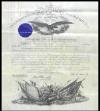

Grant, Ulysses S
(1822-1885) Commander-in-Chief of the Union army in the U.S. Civil War and
18th president of the U.S. At the outbreak of the Civil War, he was
commissioned colonel, then brigadier general, of a regiment of volunteers and
fought his first battle at Belmont, MO., on Nov. 9, 1861. In Feb. 1862 he
captured Fort Henry and Fort Donelson in Tennessee, providing the first major
Union victory, and he was at once promoted to major general. The Vicksburg
campaign (1862-63), which ended Confederate control of the Mississippi, was one
of his greatest successes. Called to the supreme command in the West (Oct.
1863), he thoroughly defeated the Confederate forces under Braxton Bragg at
Chattanooga. Lincoln made him commander in chief, with the rank of lieutenant
general, in Mar. 1864. He directed the Union army in the Wilderness campaign
(May-June 1864), wearing out the Confederates by sheer attrition; he received
Robert E. Lee's surrender at Appomattox on Apr. 9, 1865. He was made full
general in 1866, the first U.S. citizen after Washington to hold that rank.
Elected president in 1868 and reelected in 1872. His administration was
characterized by corruption, special-interest legislation, and vigorous pursuit
of a punitive Reconstruction program. Grant's Personal Memoirs (2 volume.,
1885-86) rank among the great military narratives of history.
Document
Signed ("U.S. Grant"). As President. Partially printed, accomplished in
manuscript. One page, 15¾ x 19½", Washington D.C., April 14, 1869.
Countersigned by Secretary of War John A. Rawlins. Being an Army appointment to
one John Coppinger. On vellum. Wafer seal intact and affixed to upper left.
Recorder's signature at upper left corner. One vertical and five horizontal
creases; light soiling and toning. Ink of Grant's signature has bled a bit, and
accomplishing ink has faded a bit. Still, in very good to fine
condition.
Rising in the ranks, here our soldier, John Coppinger,
recieves the title Colonel in this appointment signed by the ever-popular
Grant. Just two years prior Coppinger had been named Captain.
Estimated
Value $800-950.
Lot 266
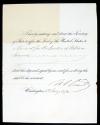

Grant, Ulysses S.
Document Signed ("U.S. Grant"). As President. Partially printed,
accomplished in manuscript. One page, quarto, Washington D.C., May 6, 1874.
Being a warrant for the pardon of one William Semmes. Two horizontal folds; a
section of light-staining at upper left measuring 4¾ x 3½";
creases likely from a paper clip at upper left; toning to edges and along folds
verso. Very slight smearing to Grant's sweeping "T". Overall, in very good
condition.
In the midst of the accusations of corruption that Grant
faced in 1874, here he bestows pardon to another: "I hereby authorize, and
direct the Secretary of State to affix the Seal of the United States to a
warrant for the pardon of William Semmes dated this day sand signed by me: and
for so doing this shall be his warrant."
Estimated Value $750-1,000.
Lot 267


Grant, Ulysses S. Check
Signed ("U.S. Grant"). Partially printed, accomplished in manuscript.
8¼ x 2¾", Washington D.C., April 27, 1867. Drawn on his account at
Jay Cooke & Co. Bankers. Made payable to William Elrad in the amount of five
hundred dollars. In black ink. Endorsed by Elrad on verso and made over to
another payee. A two cent stamp, "Paid" and a date stamp appear on front, there
are two cancellation punches and somewhat ragged edge separation in the middle
of the center fold. The date stamp overlays, but does not obscure, the
"U" of the signature. Very good condition.
Estimated Value $400-500.
19th Century Sino-American Relations
Lot 268
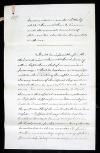

[Grant, Ulysses S.] and
China. An important document outlining concerns for a planned Grant trip to
China in 1879-1880. Six pages, quarto, Shanghai, June 5, 1879. Docketed (US
Consulate General Shanghai) on verso. Linen binder at top right corner,
transmittal folds, minor surface soil. Fine.
Complied while preparing
for Grant's visit, this is a fascinating, well-reasoned analysis of Grant's
position vis-a-vis Chinese officials. Faced with the unique problem of
explaining the position of a past president to a society ruled by lifetime
monarchs, the unnamed diplomat who created this document has written: "That he
has been a sovereign will be their ruling thought; and, from the very
nature of things, as they understand them, he can not be much less now...We can
not undertake to teach them, on this special occasion, wherein a Republic
differs from a Monarchy...The Emperor...and the Viceroy...are the only
Chinese upon whom the General should call..." While on his post-Presidency
travels across the globe, Grant visited China, stopping in Hong Kong, Canton,
Shanghai, Tienstin and Peking. This wonderful document presents a truly
fascinating picture of the 19th century American view of China and is an
important piece of diplomatic and presidential history.
Estimated Value
$500-600.
Lot 269
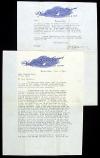

Harding, Warren G
(1865-1923) 29th president of the U.S. (1921-23). An Ohio Republican,
Harding was elected (1914) to the U.S. Senate and was a compromise choice as
Republican presidential candidate in 1920. His administration had one
achievement-the calling (1921) of the Washington Naval Conference. He had
promised to appoint a cabinet of the "best minds," but in 1923 came rumors of
government scandals. Harding died suddenly (Aug. 1923) in San Francisco on his
way back from Alaska. He thus was spared the public exposure of the Teapot Dome
scandal and the humiliation of seeing his cabinet appointees Albert B. Fall and
Harry M. Daugherty brought to the bar of justice. Harding's administration has
been called one of the most corrupt in U.S. history.
Typed Letter
Signed ("W.G. Harding"). Two pages, quarto, Marion, Ohio, July 6, 1914.
On "The Harding Publishing Company" letterhead. To Senator Charles Hogg.
Transmittal envelope included, as is a campaign postcard featuring Harding and
a form letter from the Marion Clearing House Association endorsing Harding.
Transmittal folds with minor edge separation, very minor feathering at
signature. Fine.
Senator Hogg, a family friend, had given his support in
the Senate race to Senator Foraker and Harding's disappointment is evident in
this letter, "...I understand that you are already committed and I confess that
I am sincerely disappointed though I can make no complaint thereat. Recalling
our numerous agreeable visits on more than one occasion.I had hoped that you
had not already pledged your support. I confess there was a bit of sentiment
about it, too, because my father in law, who came to be one of my very best
friends before his death, often talked about you with affectionate interest...I
am not reciting things in an endeavor to have you change your attitude...I am
sure that you know I admire the ability of Senator Foraker, quite a as much as
you do....he offered to get out of my way early in April if I would become a
candidate. At that time, I had no notion of doing so and so told him. Later on,
a great many Republicans...argued that I ought to get into the race on the
ground that we could not effect an united party if the Senator were the
nominee...I was persuaded through the earnestness of their representations to
enter the race...I am firmly convinced that nothing but the return to power of
the Republican party will restore us to the full tide of American good
fortune..." Exceptional political content. Harding was successful in the
campaign and held the office of Senator until he was elected President in 1920
-- obviously, the campaign in question was an important step in his political
career.
Estimated Value $1,500-1,800.
Lot 270
Harding, Warren G.
Check Signed ("Warren G. Harding"). Partially printed, accomplished
in type- and manuscript. 8¼ x 3", Washington D.C., April 15, 1921. Drawn
on his account at The Riggs National Bank. Made payable to Wise Brothers. In
black ink. Stamp endorsement from Wise Brothers on verso, punched cancellation
and date stamp on recto. Two vertical folds, the date stamp is close to, but
does not touch, the signature and there is some ink transfer from the verso to
the face. Very good condition.
Estimated Value $100-200.
Lot 271


Harding, Warren G.
Check Signed ("Warren G. Harding"). Partially printed, accomplished
in type- and manuscript. 8¼ x 3", Washington D.C., April 15, 1921. Drawn
on his account at The Riggs National Bank. Made payable to The New York Beef
Company. In black ink. Endorsed on verso, punched cancellation and date stamp
on recto. Two vertical folds. Very good condition.
This lot also
includes a letter from G.T. Harding indicating the checks came directly from
him.
Estimated Value $100-200.
Lot 272
Harrison, Benjamin
(1833-1901) 23d president of the U.S. (1889-93). A grandson of William
Henry Harrison, he commanded an Indiana volunteer regiment in the Civil War,
became a corporate lawyer, and served (1881-87) as U.S. senator from Indiana.
The Republicans chose him (1888) as presidential candidate against Grover
Cleveland. After what has been called the most corrupt campaign in U.S.
history, he was elected by the electoral college, though Cleveland had won the
popular vote. He approved all regular Republican measures, including the highly
protective McKinley Tariff Act. The first Pan-American Conference was held
(1889) during his administration. Defeated (1892) for reelection by Cleveland,
he later represented Venezuela in the Venezuela Boundary Dispute.
Signature ("Benj Harrison"). One page, 3½ x 2¼,
n.p., n.d. Black ink on cream card stock. Minor surface soil, adhesive residue
on verso. Very good to fine condition.
Estimated Value $100-150.
Lot 273
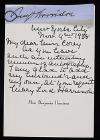

Harrison, Benjamin and Mary
Lord. Signatures ("Benj Harrison" and "Mary Lord Harrison").
One page, 3½ x 5¼", Lord signs from New York City, November 4,
1938. President Harrison's signature is on blue lined paper clipped to the
top edge of Mrs. Harrison's note card. Mrs. Harrison has penned a brief note
regarding the signatures: "As you have such an interesting number of
autographs I am glad to add my husband's and my own..." There is some ink
show through on the blue paper which does not affect the signature, otherwise
this lot is fine.
Estimated Value $125-150.
Lot 274
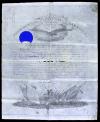

Hayes, Rutherford B
(1822-1893). 19th President of the U.S. (1877-81). Hayes served (1865-67)
as a Republican in Congress and was three times elected (1867, 1869, 1875)
governor of Ohio. In 1876, chosen as the Republican candidate for president, he
ran against Democrat Samuel J. Tilden. In the election the returns of South
Carolina, Louisiana, Florida, and Oregon were disputed, and Congress created an
electoral commission to decide the result. The commission awarded all the
disputed returns to Hayes, thus giving him a majority of one in the electoral
college. Indignation over this partisan decision affected Hayes's
administration, which was generally conservative and efficient and no more. He
withdrew federal troops from Louisiana and South Carolina, ending the
Reconstruction era.
Document Signed ("R B Hayes"). As President.
Partially printed, accomplished in manuscript. One page, 16 x 19½",
Washington D.C., June 12, 1879. Countersigned by Secretary of War George
McCrary. Being an Army appointment for one John J. Coppinger. On vellum. Wafer
seal intact and affixed at upper left. Recorder's signature at upper left
corner. With one vertical and five horizontal creases; splitting along central
horizontal fold measuring 4½: in length; two splits along vertical fold,
a few light stains and toning. In good condition overall.
Towards the
end of his presidency, here Hayes grants one John J. Coppinger to be Major of
the Tenth Regiment of Infantry. Coppinger had served in the 1865 Appomattox
Campaign, and was appointed Colonel thereafter. Clearly, this document records
the career of a brave soldier.
Estimated Value $300-400.
Lot 275
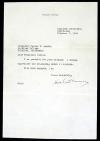

Hoover, Herbert C.
Typed Letter Signed ("Herbert Hoover"). One page, quarto, Stanford
University, November 7, 1928. On personal stationery. To Walter Dexter,
President of Whittier College. Transmittal folds, minor foxing and surface
soil. Very good condition.
One assumes this letter was written on
receipt of good wishes about the Presidential election. "I am grateful for your
message. I deeply appreciate the friendship which it conveys..."
Estimated
Value $150-250.
Lot 276
Hoover, Herbert C
(1874-1964) 31st President of the U.S. (1929-33). He easily won the 1928
Republican presidential nomination and defeated Democrat Alfred E. Smith. His
administration was dominated by the Great Depression, ushered in by the stock
market crash of Oct. 1929. Believing that the economy would regenerate
spontaneously, Hoover was reluctant to extend federal activities. In 1932 some
15,000 ex-servicemen, known as Bonus Marchers, marched on Washington to demand
immediate payment of their World War I bonus certificates. Hoover ordered
federal troops to oust them from government property. In 1931 Hoover proposed a
one-year moratorium on reparations and war debts to ease the financial
situation in Europe. He ran for reelection in 1932 but was overwhelmingly
defeated by Franklin D. Roosevelt. Later Hoover coordinated (1946) food
supplies to war-ravaged countries and headed (1947-49) the Hoover Commission,
which recommended administrative reforms of the executive branch. He headed a
second commission (1953-55), which studied policy and organization.
Signature ("Herbert Hoover"). As Secretary of Commerce. One
page, 3 x 1½", n.p., 1927. Lot includes tinted postcard of Hoover,
Letter from his Department of Commerce Secretary and original transmittal
envelope. Minor ink dots at top edge of autograph card, faint paper clip
impression, otherwise very good to fine.
Estimated Value $75-125.
Lot 277


Jackson, Andrew
(1767-1845) 7th President of the U.S. (1829-37). Jackson helped to draft
the Tennessee constitution and was elected (1796) to the U.S. Congress. In the
War of 1812 he decisively defeated seasoned British troops at New Orleans (Jan.
8, 1815). "Old Hickory" was the greatest hero of his time and became associated
with increased popular participation in government. This so-called Jacksonian
Democracy almost won him the presidency in 1824, but the election ended in the
House of Representatives with a victory for John Quincy Adams. Jackson was
elected president in 1828 and brought a strong element of personalism to
Washington. His Kitchen Cabinet was powerful, and the Spoils System developed.
Jackson and Vice Pres. J.C. Calhoun differed on Nullification, and Calhoun
resigned (1832). Jackson's fight against the Bank of the United States was an
important issue in the election of 1832, in which he defeated Henry Clay. He
then transferred federal assets from the bank to chosen state, or "pet," banks.
In 1836 he issued the Specie Circular, which said that all public lands must be
paid for in specie and which hastened the Panic of 1837.
Free Frank as
President. Quarto address leaf "Free Andrew Jackson", Washington DC,
February 18 1837. Postmark overlays, but does not obscure, "Free."
Transmittal folds with some edge separation, old tape repair brushes edge of
"n," discoloration over address, tears where seals removed. Very good
condition.
An unusual free frank, as the original letter is still
attached! The two page letter, signed "Sarah" (doubtless Jackson's
daughter-in-law and White House hostess Sarah Yorke Jackson), is addressed to
Emma Donelson in Philadelphia. Offering condolences to her "Dear Sister" over
the loss of a child, Sarah's love and concern are obvious. Rachel Jackson's
Donelson relatives were numerous and Emma is likely one of these relations.
Estimated Value $1,100-1,350.
Lot 278
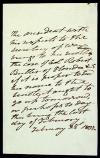

Jackson, Andrew.
Autograph Letter. As President. One page with integral blanks, directed on
the address leaf, octavo, n.p., February 28, 1837. In black ink. To the
Secretary of War Benjamin F. Butler. With two horizontal folds, reinforcing
tape along edge, ink has smeared on three words at right edge, and a 1½"
vertical tear to address leaf which does not affect Jackson's writing. In very
good to fine condition overall.
In the early 1800s, Andrew Jackson
appointed Colonel Robert Butler (1786-1860) to be Florida's first Surveyor
General. Here, Jackson requests that the Senate promptly address a matter
pertaining to the Army Colonel, writing in the third person: "The President
with his respects to the Secretary of War brings to his recollection the case
of Col. Robert Butler of Florida if it is proper to send his name to the
Senate, it ought to go up tomorrow, or perhaps today -- this being the last day
of February -- February 28th 1837." Butler, it seems felt a strong bond
with the President, as an archive of his poetry revealed a eulogy of "Old
Hickory" written at the time of his death.
Estimated Value $1,000-1,500.
Lot 279
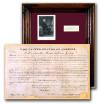

Jackson, Andrew.
Document Signed ("Andrew Jackson"). As President. Partially printed,
accomplished in manuscript. One page, folio, Washington, D.C., November 16,
1830. Being a land grant. On parchment. In black ink. With original wafer seal
affixed at lower left. Framed to an overall size of 26 x 30". Several areas of
paper loss around edges, notably just below Jackson's signature. Likely treated
to remove foxing. Still, in good condition.
In the dawn of his
Presidency, Jackson grants a parcel of land in the city of Cahaba, a town which
was once the capital of Alabama (1820-1826). Unfortunately for Mr. Thomas
Mason, the named purchaser, Cahaba became a ghost town shortly after the Civil
War, and is now an archeological park.
Estimated Value $700-1,000.
Lot 280
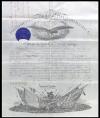

Johnson, Andrew
(1808-1875) 17th President of the U.S. (1865-69); he rose in Tennessee
politics to become congressman (1843-53), governor (1853-57), and U.S. senator
(1857-62). As a Southerner and a war Democrat, he was an ideal choice as a
running mate to Lincoln on the successful Union ticket in 1864, and he
succeeded to the presidency after Lincoln's assassination. As president he was
denounced by the radical Republicans for his Reconstruction program, and in
1866 his political power began to decline sharply. When Johnson tried to force
Secy. of War Edwin M. Stanton-whom he rightly suspected of conspiring with
congressional leaders-out of office, the radical Republicans sought to remove
the president. On Feb. 24, 1868, the House passed a resolution of impeachment
against him. In spite of tremendous pressure brought to bear on several
senators, the Senate failed to convict by one vote. Johnson's administration
had some accomplishments, notably the purchase (1867) of Alaska. After his
presidency he was returned (1875) to the Senate from Tennessee, but died
shortly afterward.
Document Signed ("Andrew Johnson"). As
President. Partially printed, accomplished in manuscript. One page, 15¾ x
19½", Washington D.C., April 11, 1867. Countersigned by Secretary of War
Edwin M. Stanton. Being an Army appointment for John J. Coppinger. On vellum.
Wafer seal intact and affixed at upper left. Recorder's signature at upper left
corner. One vertical and five horizontal creases, slight fold at upper right
corner. Ink stutters a bit in Johnson's signature. Else, in very good to fine
condition.
In 1865, our solder, one John Coppinger, had bravely served
in the Appomattox Campaign. Likely, this appointment of Captain of the Twenty
Third Regiment, was granted by President Johnson in recognition of his dutiful
service. Interestingly, this document was also signed by Secretary of War
Stanton, whom Johnson would remove from office in just four months' time -- an
action which was just one of Johnson's acts of retaliation against the Tenure
of Office Act.
Estimated Value $700-900.
Go to Next Catalog Page















